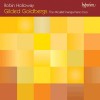| Country: | United Kingdom |
| Period: | Contemporary classical music |
Biography
Robin Greville Holloway (born 19 October 1943) is an English composer, academic and writer.
Holloway was born in Leamington Spa. From 1953 to 1957, he was a chorister at St Paul's Cathedral and was educated at King's College School.[1][2] He attended King's College, Cambridge and studied composition with Alexander Goehr.
In 1974, Holloway became an Assistant Lecturer in Music at the University of Cambridge, and in 1980 attained a full Lecturer position. In 1999, he became a reader in Musical Composition at Cambridge and, between 2001 and his retirement in 2011, Professor of Musical Composition. He is also a Fellow of Gonville and Caius College, Cambridge.
Holloway's doctoral thesis Debussy and Wagner (later published as a book by Eulenburg), discussed a close relationship between music and language as well as romanticism and tonality. This can be heard in his own works, such as Scenes from Schumann (1969–70), the opera Clarissa (1976) premiered in 1990 at English National Opera under the baton of Oliver Knussen, and Seascape and Harvest (1983-4) composed for the City of Birmingham Symphony Orchestra and Sir Simon Rattle.[3]
Holloway contributed a regular music column to The Spectator magazine between 1988 and 2010. Two collections of his journalistic and other occasional writings have been compiled and published, as On Music: Essays and Diversions 1963-2003 (Continuum Press, 2003 hdbk/2005 pbk, ISBN 0-8264-7629-5) and Essays & Diversions II (Continuum Press, 2008, ISBN 0-8264-9728-4).
Holloway has been described as a "neo-romantic" composer, reflecting his own affinity for music of the last part of the 19th and early part of the 20th centuries.[4][5] While some of his works do conform to this description, others evince a more complex, nuanced, and at times ironic relationship to music of the past, verging on the post-modern. According to fellow composer David Matthews, his "individual style has been formed by a productive conflict between Romanticism and Modernism."[6]
Holloway's Fifth Concerto for Orchestra was premiered at The Proms in 2011.[7]
In 1994 his Second Concerto for Orchestra, released by NMC, won a Gramophone Award.







